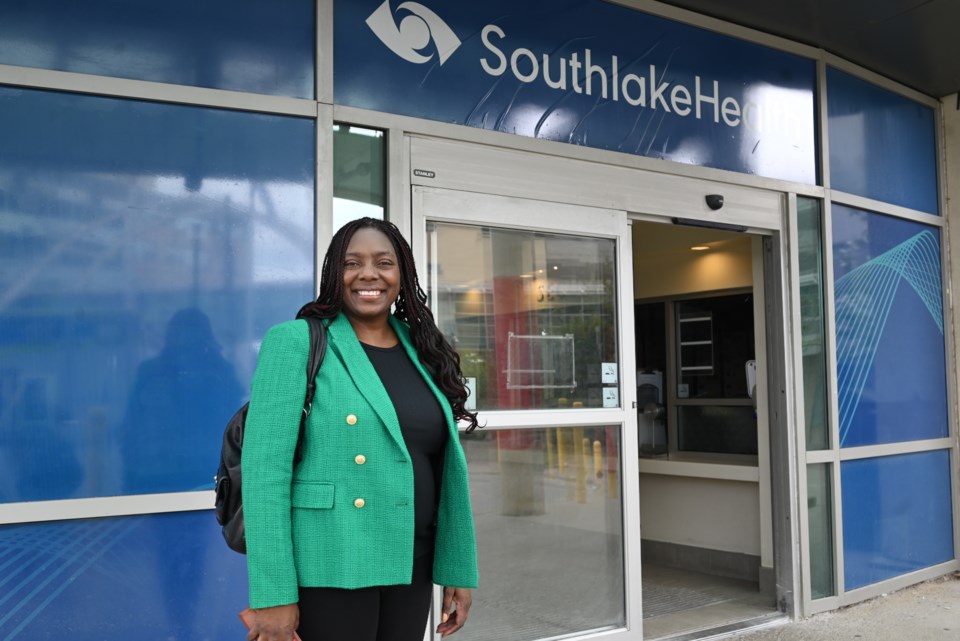The new president of the Ontario Medical Association visited Newmarket and Southlake Health May 14 to learn about the challenges local health care providers are facing.
Dr. Zainab Abdurrahman visited the local hospital and family medicine clinics as part of her regular duties, meeting with health-care providers across the province. Abdurrahman, the first Black woman OMA president, said it is a chance to better understand the challenges health care is facing.
“It’s one thing for someone to tell you about the issues that they're facing, but then you can actually see some of the constraints,” she said. “It gives me a really better idea of the people that I’m speaking up for and representing.”
The OMA has been advocating to the government for ways to address ongoing health care issues like overcrowding of hospitals and a shortage of family doctors in Ontario. Southlake Health is among the facilities under strain, with long wait times for hospital admission and ongoing efforts to secure a second hospital site.
Abdurrahman said she was able to have a good, frank discussion with family health doctors about the challenges they face. She also met with the Southlake executive team to understand space limitations at the hospital and some of their attempted solutions to alleviate the crowding.
“Overcrowding in our emergency rooms and in our hospitals are across the board. Every hospital is raising an alarm to this,” she said. “We continue to champion for more … A lot of the hospitals, I think, all really need more funding, they need more infrastructure.”
“We are really seeing the constraints of the system,” she said.
Southlake chief of staff Dr. Charmaine van Schaik and vice-president of medical affairs Dr. David Makary said the hospital was proud to welcome the OMA president.
“Every day, more than 700 physicians at Southlake work together to deliver leading-edge care, close to home, to some of the fastest-growing communities in Ontario. As these communities continue to grow and become more diverse, it's important that Southlake also evolves to meet the needs of patients, as well as physicians and staff,” they said in a joint written statement. "It was an honour to share with Dr. Abdurrahman the incredible work physicians are doing at Southlake and showcase how our teams are shaping the future of health care.”
Abdurrahman said family medicine is also in a state of crisis. In the years ahead, the association projects that one in four Ontarians will not have a family doctor.
“It’s been a chronically underfunded system. It’s just not viable to open up a comprehensive family medicine clinic,” she said, adding that the province needs to make family medicine more viable for medical graduates to consider.
Despite the challenges faced, she said she is optimistic about the upper levels of government taking action after the elections of the past few months.
"They are aligned in terms of seeing that this is a crisis that needs to be addressed,” she said of provincial and federal governments. “We have a lot of solutions that we want to work with the government to put forward.”
The OMA has advocated for changes, including reducing administrative burden on family doctors and improving funding across the system.
Measles outbreak
Measles outbreaks have risen across the province. York Region Public Health issued a notice about several possible exposure sites May 14.
The disease is something Ontarians should be concerned about, Abdurrahman said.
“We’re having an outbreak at quite a significant level, specifically in Ontario, compared to other areas of the country,” she said. “It’s extremely contagious, but it’s also extremely preventable.”
Measles has historically been controlled through childhood vaccination program. She said some clinics can be accessed through public health for measles vaccines.
She said measles is something that health-care providers will need to watch out for, as it can lead to “devastating issues.”
Asked about combating the uncertainty some might have regarding vaccines, Abdurrahman said that it is about having people establish relationships with a doctor to have frank conversations.
“Hesitation with vaccines can differ, person to person, community to community,” she said. “So if you have that safe space that you can have those discussions, then hopefully, then your family doctor can alleviate these concerns.”




